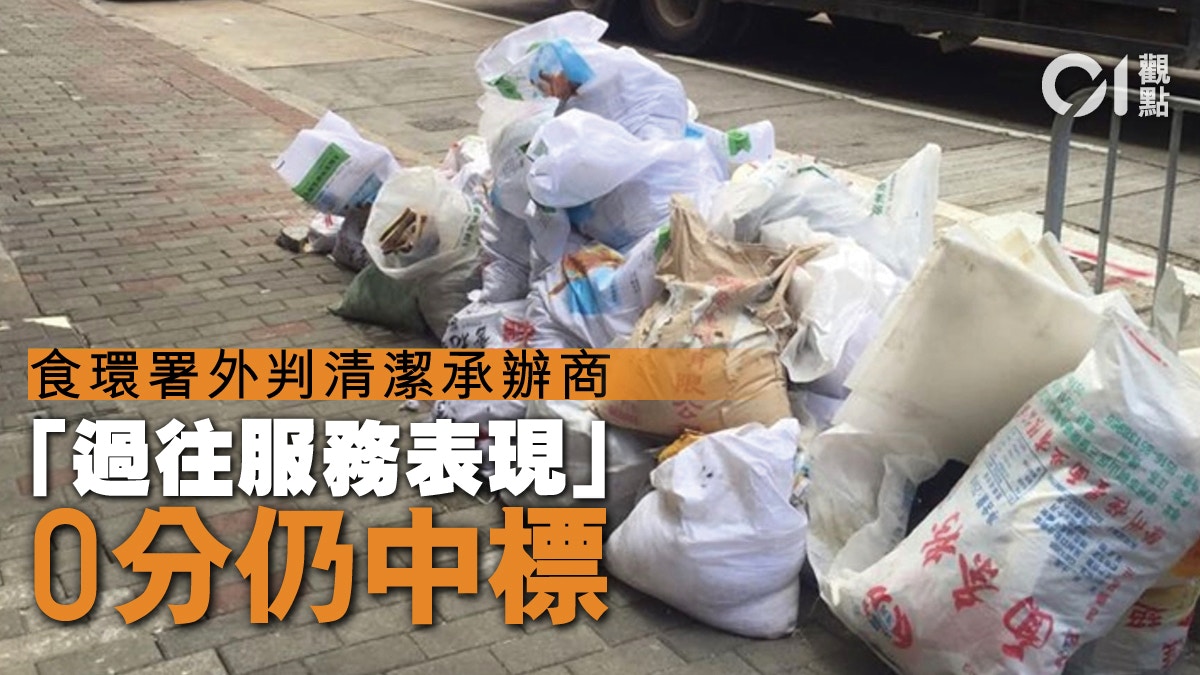01 view
Written by: Commentary Editing Room
2020-10-31 06:00
Last update date: 2020-10-31 06:00
The Office of The Ombudsman issued a proactive investigation report on Thursday (29th), criticizing the Food and Environmental Hygiene Department for its inadequate supervision of outsourced cleaning services and inability to encourage outsourcers to improve their services, especially the monthly service fee deducted by outsourcers due to default If the amount is too small, the past service performance scoring item does not help to distinguish between the pros and cons of outsourcers, and even those who score zero in the item can win the bid again.
The PCPD is advisable to improve the quality and efficiency of public services, such as strengthening penalties while formulating incentive schemes, strengthening inspections and analyzing complaints, and continuing to introduce new technologies.
However, the report did not touch on the core issue. The half-bucket outsourcing competition is full of shortcomings and cannot achieve the effect of improving quality and efficiency. The government should thoroughly review the clean outsourcing system.
The Office of The Ombudsman took the initiative to investigate the mechanism and effectiveness of the FEHD’s supervision of outsourced street cleansing services, and issued an investigation report.
(Photo by Gao Zhongming)
The report affirmed the reforms in the evaluation of tenders for outsourced cleaning services of the Food and Environmental Hygiene Department since last year, such as increasing the technical scoring ratio to 50%, so as to prevent contractors from robbing workers at low prices.
The report used a few examples to denounce the agency's negligence in monitoring successful bidders, and the indicators and penalties were not deterrent.
Outsourced deductions do not "put into the meat", poor past performance can still win the bid
First, the FEHD will issue a "Non-Liability Notice" to deal with the contractor's poor service and deduct the monthly service fee in the contract. However, the Office has calculated that the average deduction per contract is only 81,000 yuan, compared The average total value of each contract is about 110 million yuan, which is only a drop in the bucket. Moreover, the FEHD only regards the deduction action as the recovery of administrative costs, and the intention is not to punish outsourcers.
Second, the FEHD stated that the more contractors were issued with "Non-Liability Notices", the lower their scores for the "Past Service Performance" items in the review of tenders. However, the Office of the Commissioner's Office reviews the winning contracts from April 2019 to March 2020 All related projects scored only 0 to 3 points under a full score of 7.5, and more than half of the contracts scored zero. This shows that the project cannot distinguish between the pros and cons of the contractor, and cannot kick the poor under the mechanism. The design mechanism is incredible.
At present, labor dispute claims are mostly handled by civil labor tribunals. Therefore, losing a contractor does not amount to a criminal offence. Not only does it not need to deduct points, it can continue to bid for government outsourcing service contracts.
(Profile picture / Photo by Liang Pengwei)
Third, the FEHD has a deduction system for “employment default”. Every time the department issues an employment “notice of default”, the relevant contractor will be deducted one point, and three points will be deducted. It is not possible to bid for any government department contract within five years. However, such penalties were not adopted in cases of poor service, and no contractor was deducted full three points during the ten years from April 2009 to March 2019.
In response to the above-mentioned problems, the department proposes to include "poor service" in the deduction system, deduct more monthly service fees, not only to recover administrative costs, but also to make full use of the "past service performance" item to strengthen "default "Notice" validity.
The daily tasks of cleaners in the FEHD include taking out rubbish, sweeping streets and cleaning trash cans.
The report should touch the outsourcing system itself
However, although the Office’s report hopes that the FEHD will improve its outsourcing system, it fails to evaluate the effectiveness of outsourcing government cleaning services in terms of concepts and practices.
In practice, compared with the problems of loose penalties and less encouragement, the fundamental reason why the current outsourcing system has failed to improve the quality of cleanliness is probably the lack of competition and choice.
In the past, four or five outsourcers have taken over 80% of the cleaning contracts. Even though the FEHD has broken down the scope of contract services since 2014, and hopes to introduce small and medium-sized outsourcers to strengthen competition, those outsourcers are still dominated.
Does this mean that the scope of services is further divided, for example, one split into four, one split into six, so that society can feel the benefits of service competition?
Unless the Food and Environmental Hygiene Department has provided excellent service in the past, and small and medium-sized outsourcers who have not tendered in the district add points, the overall situation will not change.
Conceptually, the outsourcing system itself may not be beneficial to the service, the government or even the workers.
The government originally believed that outsourcing could reduce direct management services and employee performance, thereby saving government manpower and expenditure.
However, this kind of supervision system may have counter-effects. In order to increase profits, outsourcers may reduce manpower or increase the workload of each person. Too much work will prevent workers from reaching every cleaning point on time. If they encounter more Strict FEHD foremen will be issued "notices of default" for being late or inaccurate in their cleaning performance. As a result, the outsourcers will blame and pursue these workers.
If this kind of system contradiction is not dealt with, it will hurt the welfare of grassroots employees at any time.
Under the raging new crown pneumonia epidemic, the governments of many countries and regions define cleaning workers as "essential workers" and they are an indispensable part of society.
For such an important industry, the government should ensure the stability of services and allow employees to receive reasonable treatment. Therefore, the government should constantly review services and improve the treatment of workers. Such work is not a department of the Ombudsman that can bring about change. It is up to all policy bureaus to work together.
The support of cleaning workers is even more insufficient under the same payment
[New Coronary Pneumonia] What can the government do when cleaning workers are recruited one after another?
How sincere is the Deputy Director of the Food and Environmental Hygiene Department in remarks to leave the ground to improve the treatment of cleaners?
The Office of The Ombudsman FEHD Cleaner 01 Viewpoint













